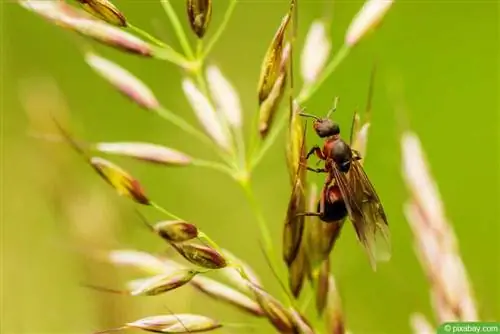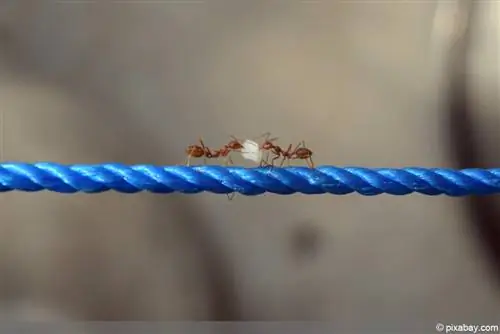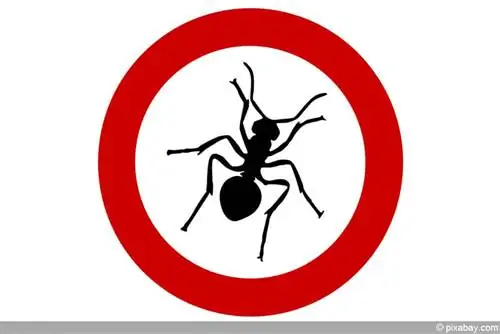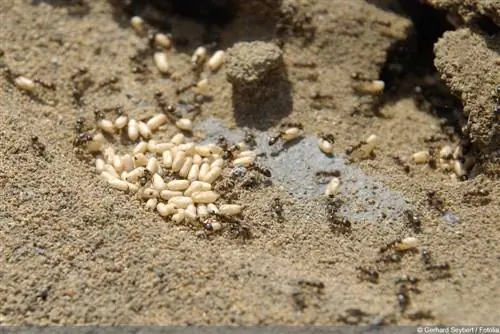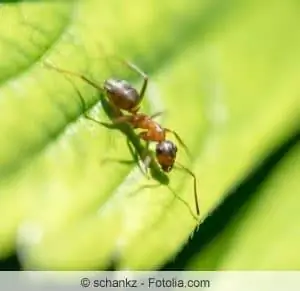- Author admin caroline@plants-knowledge.com.
- Public 2023-12-17 03:39.
- Last modified 2025-01-24 12:45.
Ants are undesirable in the house and garden. Just before summer begins, swarms of flying ants can be observed. Where are you from? How do you get rid of them quickly?
Where do flying ants come from?
Flying ants are not a special species. They are ordinary ants that are on their nuptial flight. When ants become sexually mature, they grow wings. Flying ants are unpleasant. However, they do not pose any danger. They are not looking for food, they are simply looking for a partner to reproduce. The nuptial flight only lasts a few days. After mating, the males die. The females then establish their own state or return to their nest.
Repel flying ants
Avoid using poison. We have put together 12 methods for you to effectively banish the little animals from your house.
Attach fly screen
One way to prevent flying ants from entering your home is to use fly screens. Install these in early May. In June, the nuptial flight of the native ants is already over. Keep windows and doors closed.
Use essential oils
People love the fresh smell of citrus fruits. This scares ants away. Place citrus-scented potpourris in your home or use aroma lamps.
Planting fragrant herbs
As an alternative to using essential oils, scented plants help keep ants away from the house even outside of their nuptial flight. Plant scented herbs in pots and containers and place them near doors and windows. The following herbs have proven themselves:
- Lavender
- Rosemary
- Sage
- Mint
- Thyme
- Marjoram
By the way:
Scented herbs can also be dried and crushed and sprinkled on the ant trails. This interrupts the insects' path from the nest to food and causes the creepy crawlies to move out of the house.
Use tea tree oil
Tea tree oil is a true all-rounder. Dilute the oil with water and apply a thin layer of it to window and door frames. The smell scares the flying ants away and they run away.
Attention:
Test the smell of the tea tree oil before use. You should only use this trick if you don't find it unpleasant.
Blow ants away
If you discover a swarm of flying ants in your apartment, take a hairdryer and simply blow the pests away. They can't stand the draft and escape through the open window.
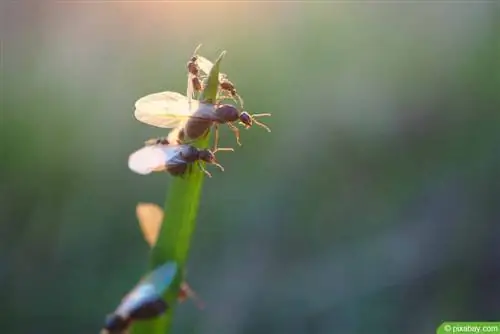
Note:
The flying ants are very similar to the dangerous termites. However, termites are not ants. They stand out because of their light yellow to light brown color. Domestic ants, on the other hand, are much darker. A clear distinguishing feature is the ants' constricted abdomen. Termites do not have this mark.
Remove food sources
Sugar and carbohydrates magically attract ants. This also applies during the wedding flight. Seal all food. Do not leave ripe fruit uncovered in the apartment. When food sources dry up, ants look for other shelter.
Attention:
Do not leave food bowls for dogs and cats on the terrace or in the house. Remove these immediately after feeding. Insects as well as mice, rats, raccoons and hedgehogs are attracted to leftover food.
Put away organic waste bins
Organic bins near the windows are not a good idea. In addition to ants, other insects and unwanted small animals are also attracted. Make sure that you do not place the waste containers in the immediate vicinity of windows and doors.
Use vinegar cleaner
Vinegar has proven itself many times as a home remedy. The smell is only unpleasant for people at first. Ants, on the other hand, cannot stand it. When cleaning, use cleaning products that contain vinegar. At the beginning of May, clean your windows and doors thoroughly with it. The flying ants will give your apartment a wide berth.
Attention:
Don't use baking soda when fighting ants. This home remedy leads to a painful death of the insects; they literally explode.
Breaking ant trails
If you discover an ant trail in your home, you have an ant nest directly on the house or even inside the house. Ant trails lead from the nest to the food source. The little crawling creatures overcome this path several times a day. For example, you can interrupt the ant trail with
- Baby powder
- Chalk
- Packaging tape or masking tape
- Lemon slices
- Aroma oils
Observe the animals' behavior after placing the obstacles. In the best case scenario, the creepy crawlies go outside and look for new sources of food. Then you'll be rid of the flying ants too.
Fighting aphids
Ants and aphids form an unusual combination. Aphids feed on the succulent leaves of our ornamental and crop plants. After ingestion, they excrete sweet honeydew. The ants love this; they literally milk the aphids to get their hands on the sweet food. Even balcony and house plants are not immune to aphid infestation. Carefully rub the leaves of infected plants with a solution of dish soap and water and destroy the aphids. When the source of honeydew dries up, the ants move to another place and the nuptial flight does not take place in your apartment.
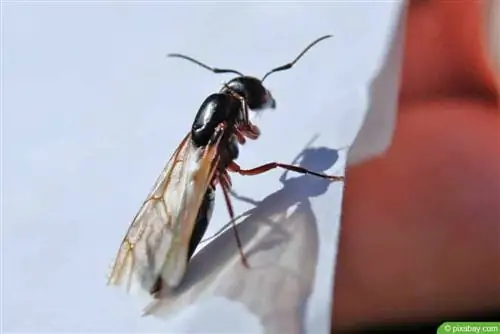
Tip:
By the way, if you plant plants that are unpopular with ants and aphids, such as lavender and rosemary, on the beds between flowers and vegetables, you will effectively prevent ant infestation.
Prevent flying ants
Be vigilant. React quickly if you see ants in the house. If you prevent nest building in time, flying ants will not become a problem in your home. Tight doors and windows, sealed joints and cracks prevent ants, mosquitoes and other vermin from entering.
Hire a pest controller
If an unusually large number of flying ants invade the house, the pest controller must be called into action. Then professional help is required. In a few cases the flying ants appear again in large numbers every year. Then an expert has to get to the bottom of the matter and remove the nests.

